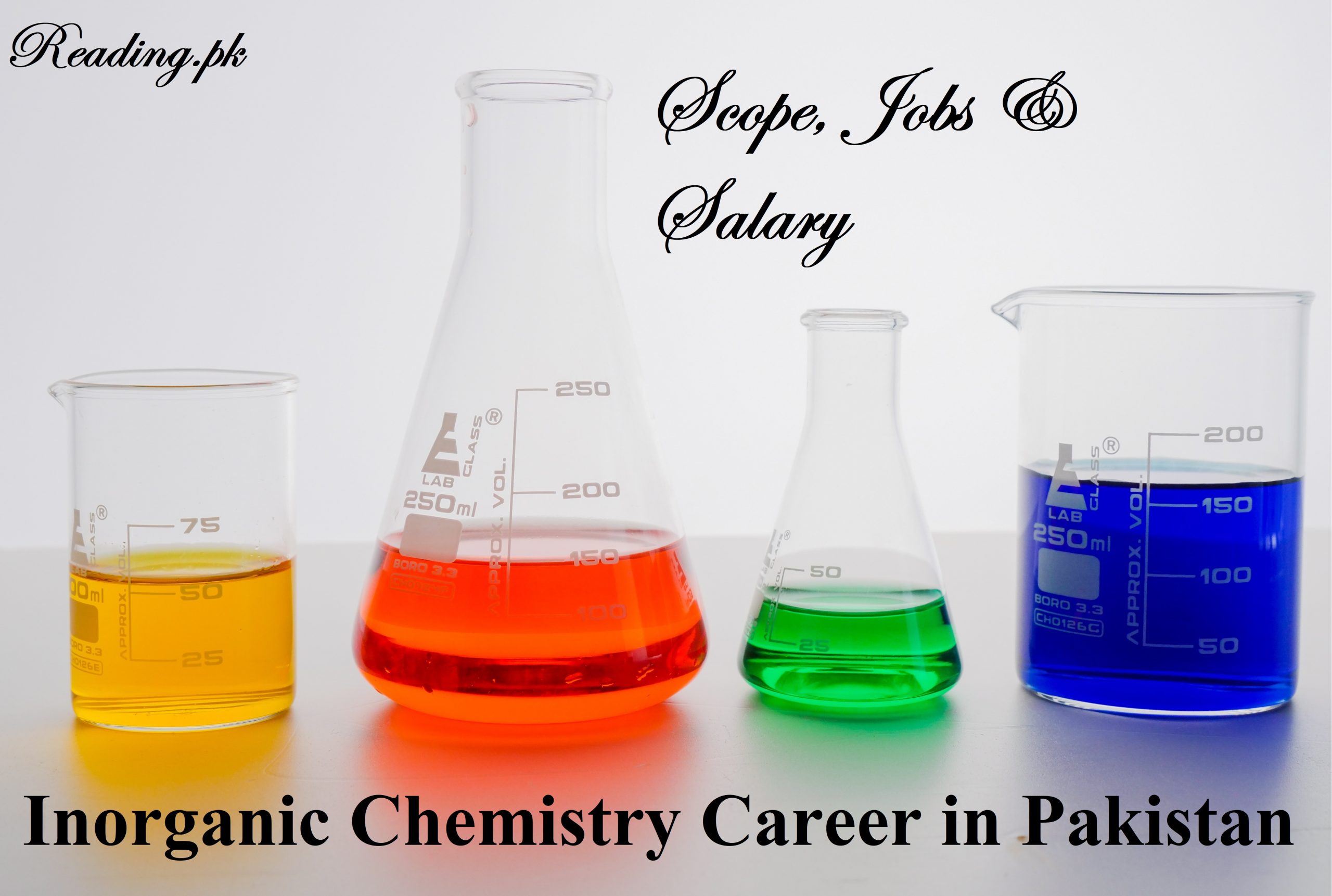Inorganic Chemistry is a subdivision of Chemistry and covers huge scope in Pakistan. Inorganic Chemistry is an emerging career in Pakistan at the industrial and medical levels. You can get all information regarding the Inorganic Chemistry career in Pakistan, including the scope of this field, career opportunities, eligibility, courses, responsibilities, work nature, specialization, job description and salary. Inorganic Chemistry deals with the behavior and synthesis of inorganic and organic compounds.
It does not include the many organic compounds (carbon-based substances), which are the subject of organic chemistry. Inorganic Chemistry is the subcategory that deals with the properties and reactions of inorganic compounds. This includes all chemical compounds without the rings or chains of carbon atoms, which fall under the subcategory organic compounds. Inorganic Chemistry is used in all areas of the chemical industry. This includes catalysis, materials science and fuels. This “speciality” is nearly as wide as the science and art of chemistry.
There are about 100,000 known inorganic compounds and approximately 2 million organic compounds. These are examples of inorganic substances:
- Table salt: Sodium chloride (NaCl).
- Silicon dioxide (SiO2): Used in solar cells and computer chips.
- Sapphire (Al2O3) – A well-known gemstone.
- H2SO4 (H2SO4), a chemical used to produce fertilizers and other household products like drain cleaners, is widely used.
[lwptoc]
Inorganic Chemistry includes studying and analyzing metals, ceramics, extreme temperatures, pressures, geochemistry and transuranium elements. This research overlaps with other scientific fields such as metallurgy and mineralogy, solid-state physics, synthetic chemistry, and even synthetic chemistry.
Inorganic Chemistry Scope for Pakistan
Inorganic Chemistry is more widespread in Pakistan than you might think. All of the chemicals in this universe can be subdivided into organic and inorganic. Chemistry studies and investigates the chemical compositions of elements and compounds. Inorganic Chemistry studies inorganic compounds other than those made up of carbon and hydrogen. Inorganic Chemistry is a key subject in Pakistan. It involves the production of thousands of chemicals, fertilizers, and pharmaceutical products. It also plays an important role in oil refining.
Inorganic Chemistry Career in Pakistan Scope and Salary

Inorganic Chemistry Career in Pakistan
Many inorganic chemical chemists opt for academic careers, where they can continue their research and pass on their knowledge to others. You will need a doctorate to teach in the natural sciences at major colleges or universities. Publication of your research in prestigious chemistry journals is essential for career advancement. Here is additional information on Inorganic Chemistry in Pakistan.
What are the benefits of studying Inorganic Chemistry?
There are several advantages to qualifying in inorganic chemistry, some of which include:
- A degree in inorganic chemistry provides access to a multitude of career opportunities.
- Its career is bright, stable, and fulfilling.
- People make good money.
- A degree in inorganic chemistry enables graduates to focus on novel approaches and improvements in chemical processes.
- There will be ample possibilities to investigate the industrial, commercial, technical, medicinal, and related disciplines of chemistry.
- The career opportunities are fairly extensive and diverse.
Employment Sectors:
If you have a Bachelor of Science degree in Inorganic Chemistry, many doors are open to you. An Inorganic Chemistry degree holder can work in any of the following job areas or sectors.
- Chemical Industries
- Medical Industries
- Mining and Mineral Departments
- Glass Industry
- Seed Companies
- Petro-Chemical Industries
- Ceramics Industries
- Beverages Industries
- Forensic Labs
- Research Labs
- Pharmaceutical Companies
- Cement Industries
Inorganic Chemistry:
- Researcher
- Chemist
- Science Journalist
- Scientific writer
- Quality Testing Officer
- Scientist
- Lab Supervisor
- Analytical Chemist
- Inorganic Chemist
- Biotechnologist
- Chemical Engineer
- Healthcare Scientist
- Forensic Scientist
- Nanotechnologist
- Pharmacologist
- Research Scientist
Eligibility Criteria
For entry-level jobs as chemists or materials scientists, a bachelor’s degree is required in chemistry or another related field. For research jobs, a master’s or PhD is required. This may also require substantial work experience. Materials scientists and chemists with a PhD or postdoctoral experience often lead applied- or basic-research teams. There are also accelerated master’s and bachelor’s degrees in chemistry available through combined programs.
Nature of Work
An Inorganic Chemist is similar to an Organic Chemist. They study elements and their reactions to other elements. Inorganic Chemistry focuses on compounds that contain carbon, while organic chemistry is concerned with compounds that do not. Inorganic chemistry can be as unpredictable as the molecules it studies. Scientists are responsible for planning and executing research projects that lead to new products, testing methods and processes. To complete your tasks, you will use laboratory equipment and computer software to create reports and prepare them. Depending on your job, you might also be responsible for the supervision of laboratory assistants and quality control testing of materials that your company produces or uses.
Inorganic Chemistry Jobs Opportunities
Inorganic Chemistry is a practical science that can be applied to many fields. Many inorganic chemistry jobs are available in geochemistry, materials science and personal care. Below is a list of the top employers and industries where inorganic chemistry is employed. These include:
- Environmental Science
- Fibres and Plastics
- Microchip: Intel and Texas Instruments, Samsung Semiconductor, Samsung Semiconductor.
- Mining, Ore and Metals
- Paints, Pigment, and Coatings
Salary
Inorganic Chemistry is a high-paying field in Pakistan and most other countries. Inorganic chemists earn a good salary in Pakistan and many other countries. You can make a good living in many branches and specializations of chemistry. An average monthly salary for a chemistry graduate specializing in Inorganic Chemistry in Pakistan is PKR.60,000-150,000.
Responsibilities for Inorganic Chemists
Inorganic chemists can be found in many fields, including mining and microchips. Their work is based upon understanding:
- Analogues and behaviour for inorganic elements.
- These materials can be separated and modified in many ways.
Specific work may include:
- Methods to extract metals from waste streams.
- As an analytical chemist, you will be responsible for the analysis of mined ore.
- Researching the use of inorganic chemicals to treat the soil.
Inorganic chemists are often employed in the industry, government laboratories, and academic institutions. Government inorganic chemists say that their time is spent writing grant proposals and competing to receive research funding. Inorganic chemists are similar to material scientists and physicists in their job duties. All of them focus on the relationship between physical functions and properties. An inorganic chemist, however, is more interested in these properties at the molecular scale.
Specialization Areas of Chemistry
You must choose chemistry as your career path to build a career in chemistry. There are many specializations and branches that chemistry can be combined into. These are just a few of the many specializations available in chemistry. You can also specialize in any one of these branches.
- Analytical Chemistry
- Physical Chemistry
- Organic Chemistry
- Biochemistry
- Inorganic Chemistry
- Nanotechnology
- Molecular Biology
- Chemical Engineering
- Chemical Biology
- Histochemistry
- Thermochemistry
- Pharmacology
- Geochemistry
- Immunochemistry
- Electrochemistry
- Chemo-informatics
Inorganic Chemistry Jobs Options
You may be able to pursue a career in science and technology if you have a background in organic chemistry. This field can involve the collection and analysis of samples from a variety of chemicals, as well as maintaining lab equipment and supporting major research projects. To be a chemistry professor, researcher scientist or graduate student, you can also obtain a doctoral or graduate degree.
-
Analytical chemist
An analytical chemist can conduct basic laboratory research, develop processes and products, design instruments for the analytical analysis, and teach marketing or law. The following are typical job functions: Perform qualitative and quantitative studies.
-
Inorganic Chemist
Inorganic chemists can be found in many fields, including mining and microchips. Their work is based on understanding the behavior and analogues of inorganic elements. These materials can be separated and modified in many ways.
-
Chemical Engineer
Chemical engineers design and develop chemical manufacturing processes. To solve problems involving the production of chemicals, fuels, drugs, food or other products, chemical engineers use the principles of biology, math, chemistry, physics, and chemistry.
-
Research Scientist
Researchers scientists can contribute to advancing knowledge in natural, computer, and environmental science. They formulate hypotheses, gather data, and interpret the results to answer questions about people and the natural world.
-
Lab Supervisor
The laboratory manager/supervisor in the medical field oversees the day-to-day activities of the laboratory. This includes supervising laboratory personnel and quality assurance. It also involves managing lab data collection, analysis, and final use.
-
Forensic Scientist
Crime scene and other evidence analysis by forensic scientists. They can make objective conclusions that will help investigate and prosecute criminals or exonerate innocent persons from suspicion.
-
Science Journalist
Science journalists provide news and information on science to the public. Writing informative, entertaining summaries of pertinent findings, consulting with experts scientists and researchers, and communicating the data in a way that a non-specialist audience understands.
University Name Offered Inorganic Chemistry
- Government College University Lahore
- Kinnaird College for Women
- Lahore College for Women University
- Minhaj University
- The University of Lahore
- Government College for Women
- Government College of Science
- University of Education
- University of Punjab
- Forman Christian College
- Hajvery University
- Lahore Garrison University
